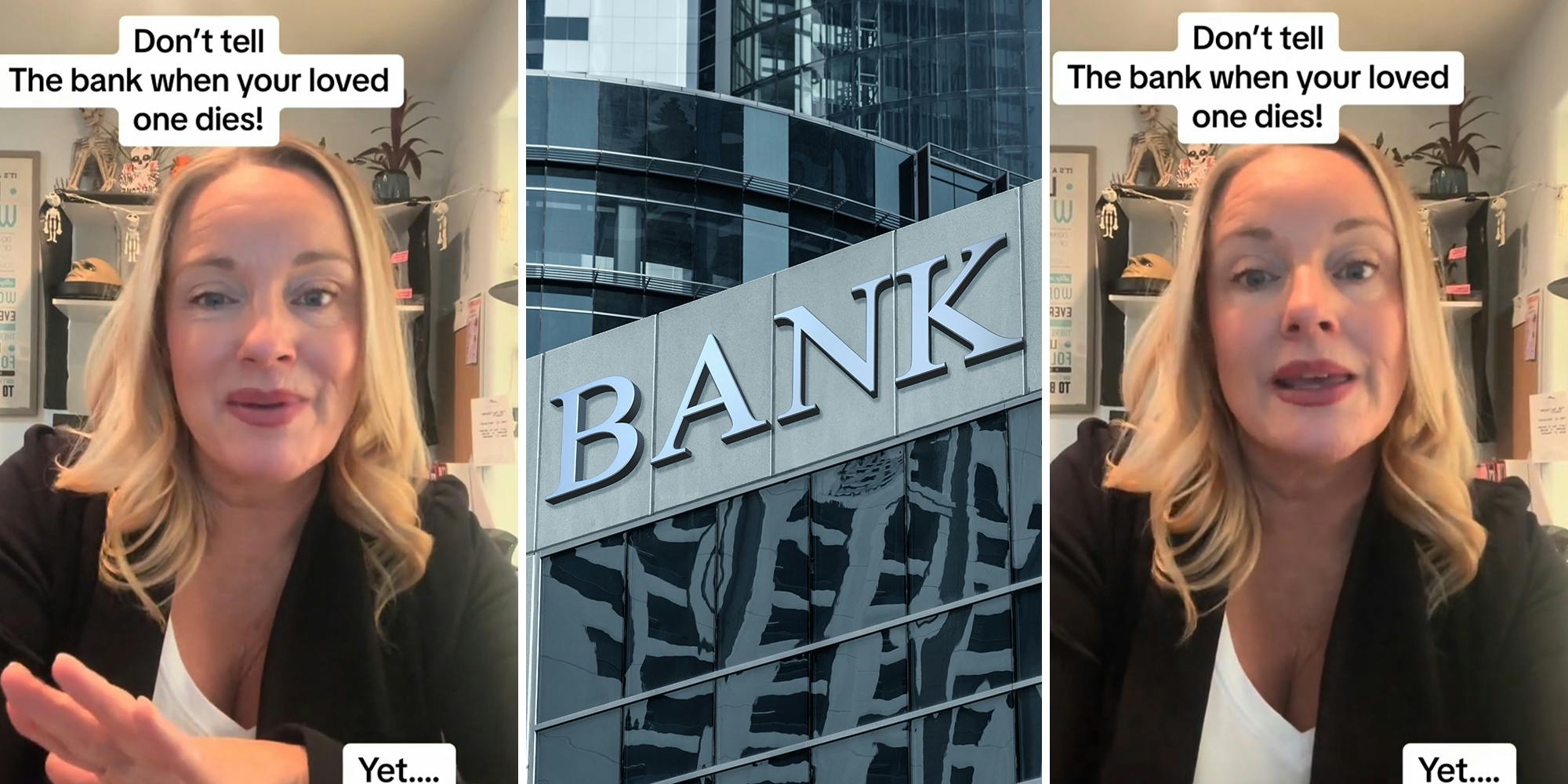‘I learned that the hard way’: Expert warns never tell the bank when a loved one has passed away. Here’s why

Losing a loved one can be one of the hardest experiences in your life, and one expert says it's best not to add stress to the occasion by prematurely informing the bank that your loved one has passed.
Amy Devine, a social worker who goes by @yourhospicesocialworker on TikTok, explains in a video what steps you should take when telling the bank a loved one has passed away so the bank does not complicate the grieving process. The video has been viewed over 695,000 times as of publication.
"When I say, 'Don't tell the bank,' I don't mean don't ever tell the bank. I just mean don't tell the bank yet," Amy explains in the clip. "Give yourself some time to grieve."
"You can use this time to start going through paperwork, bank statements, maybe gathering information on what accounts were getting automatically debited," she continues, "and making arrangements to notify those people and setting up alternative payments. While you're doing this, any automatic payments are continuing to go out of the account, and any premiums can be deposited."
Amy explains that waiting to inform the bank allows a family member time to gather all relevant information, including details on life insurance policies and electricity and utility bills. After notifying the bank, the account will be frozen, meaning nothing can be taken out or deposited. Amy says you will receive your loved one's death certificate within four to six weeks. She advises showing the certificate to the bank so you can work on accessing the funds.
"Hopefully, they have set up some kind of protection on their account, like a payable on death, where you can access those funds," she says. "Or, maybe they had a revocable trust in place, and you can show those trust documents."
"Another thing you can do to assist with the bank issue is add a joint signer," she continues. "If your loved one passes away and there's a joint signer on the account, that joint signer can still manage affairs through that account."
Though many commenters agreed with Devine's advice, several others shared that banks can be notified of an account holder's death in other ways.
@yourhospicesocialworker Once the bank is notified that an account holder has passed away the bank freezes the account. This can prevent automatic payments and premiums to be posted. Take some time to gather your thoughts and come up with a game plan. Try to find bank statements so you know what was paid and deposited into the account. Once you have that information go ahead and notify the bank. They will still need a death certificate when that arrives. Do not attempt to take or transfer any money out of that account. There are a few ways to be proactive. - Add a joint signer to your accounts - Add a payable on death to your accounts - Establish a revocable living trust - Write down important information that your family will need to know (I wrote a guidebook for this in my bio) #socialwork #socialworker #MSW #BSW #hospice #homehealth#yourhospicesocialworker #palliativecare #endoflifeplanner #caregiver #caregiving #eldercare #elderissues #advancedcareplanning #homecare #endoflifeplan #futureplanning #death #dying #hospicecare #chronicillness #chronicallyill #hospicesocialwork #healthdecisions #healthcaredecisions #caregiverfatigue #medicare #estateplanning #banking #bank ♬ original sound - Your Hospice Social Worker
"Banks are notified anyway…they knew within about ten days," one viewer said.
"Thing is, social security will also notify the bank as well, even if you don't," a second remarked.
"When I worked at a bank we read the obituary every morning and froze accts," another shared.
According to Bankrate, one issue is that funeral homes routinely inform the Social Security Administration that your loved one passed away. This is to ensure that Social Security checks stop being issued. Once the bank is notified, accounts will be frozen.
The outlet also reports that there are ways to avoid the complications. The easiest way is to have a joint account signer. The loved one can also give a family member power of attorney to allow for preparation. Another way is to consolidate accounts to make it easier to move funds. Finally, if you are gathering information about a deceased relative's accounts, you should check the state's unclaimed money database. All banks have to surrender unused accounts to the state after a period set by local laws.
The Daily Dot reached out to Devine via TikTok comments for further information.
Sign up to receive the Daily Dot’s Internet Insider newsletter for urgent news from the frontline of online.
The post ‘I learned that the hard way’: Expert warns never tell the bank when a loved one has passed away. Here’s why appeared first on The Daily Dot.
dailynoti coindeskcrypto cryptonewscrypto bitcoinmymagazine mybitcoinist cryptowithpotato mycryptoslate fivenewscrypto findtechcrunch journalpayments nulltxcrypto newsbtcarea


Post a Comment